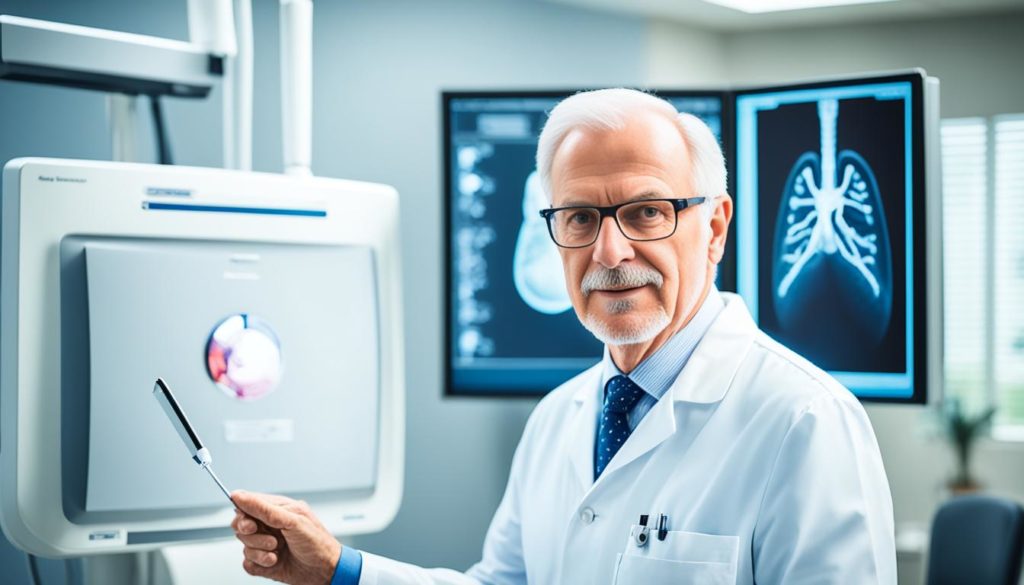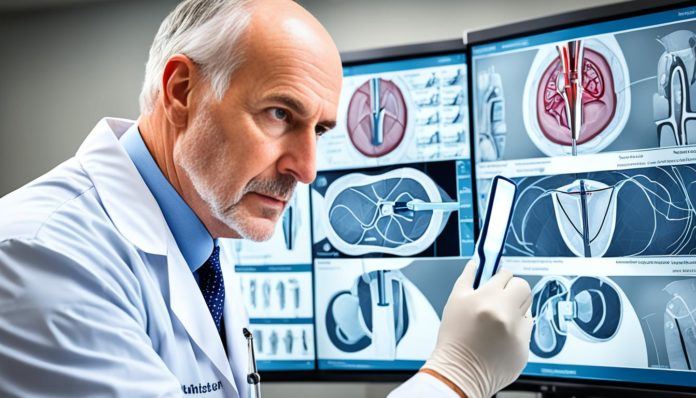Did you know prostate cancer is the second most common cancer in men in the U.S.? It affects over 174,000 men every year. This makes it crucial to have a team of experts, led by a skilled urologic oncologist. These experts are key in prostate cancer care. They work in top urology cancer centers to give each patient a treatment plan that fits their needs.
Key Takeaways
- Prostate cancer is the second most common cancer among men in the U.S., requiring specialized care.
- A urologic oncologist leads a multidisciplinary team for effective prostate cancer treatment.
- Comprehensive prostate cancer care involves numerous specialists, including oncologists, nurses, and therapists.
- The best urology cancer centers ensure a personalized approach to treatment.
- Early involvement of a urologic oncologist can offer the most effective management of prostate cancer.
Understanding Prostate Cancer and Its Impact
Prostate cancer is a major health issue for men. It affects the male reproductive system. Knowing how to diagnose prostate cancer is key for treatment and care. Thanks to new medical tech, catching it early is easier, which helps patients more.
The effects of prostate cancer go beyond just health. It can also affect a person’s feelings and mental health. This can change how well someone lives and the happiness of their loved ones. Dealing with prostate cancer means looking at the whole picture, not just the health part.

Handling prostate cancer needs a team of experts like urologists and oncologists. Working together, they make sure patients get care that fits their needs. This teamwork is key to lessening the effects of prostate cancer and helping patients recover.
“A comprehensive approach in prostate cancer care must consider not only the physical but also the emotional and psychological aspects of the disease.”
Getting the right prostate cancer diagnosis is crucial. It leads to care plans made just for each patient. These plans tackle the disease and also look after the mental and emotional sides of it. This way, patients get the best care for their body and mind.
The Role of a Urologic Oncologist in Prostate Cancer Care
Prostate cancer is a complex disease needing specialized care. A urologic oncologist, or prostate cancer specialist, is key in treating it. They have deep training in urology and oncology. This makes them ready to manage prostate cancer from start to finish.
What does a Urologic Oncologist Do?
A urologic oncologist is a doctor who deals with cancers of the urinary tract and male organs. Their main tasks include:
- Performing tests to find out how advanced the prostate cancer is
- Choosing the best treatment for each patient
- Doing surgeries like robotic-assisted prostatectomy
- Watching over patients as they recover and handling any issues
A prostate cancer specialist is crucial for treating this complex disease. They make sure each patient gets care that fits their needs. This approach greatly improves treatment results and life quality.
Importance of Specialized Care for Prostate Cancer
Getting care from a urologic oncology expert is key to beating prostate cancer. These doctors know a lot and have a lot of experience. They use the latest research and tech in treating prostate cancer.
A prostate cancer specialist works with other doctors for the best treatment plan. They do thorough patient checks, precise surgeries, and keep a close eye on patients. These steps are vital for top-notch prostate cancer care.

In short, having a urologic oncology expert in prostate cancer care is crucial. Their skills and knowledge help tackle the tough challenges of prostate cancer. This brings hope and better results for those facing this disease.
Comprehensive Diagnosis Strategies for Prostate Cancer
Prostate cancer diagnosis is key to finding cancer early and knowing its stage. It uses many methods to spot and check prostate cancer at different stages. This approach combines old and new techniques to help patients the most.
First, doctors use the PSA test and DRE for screening. If PSA levels are high, more tests might be needed. Prostate cancer surgery and other treatments rely on accurate tests.
Tests like mpMRI and PSMA PET scans give clear pictures, helping with staging and treatment plans. These scans are very useful for those looking at advanced treatment options.
- Screening: PSA test, DRE.
- Imaging: mpMRI, PSMA PET scans.
- Biopsies: Targeted and systematic.
| Diagnostic Method | Description | Benefits |
|---|---|---|
| PSA Test | Measures the level of prostate-specific antigen in the blood. | Initial screening for abnormalities. |
| Digital Rectal Exam (DRE) | Physical examination of the prostate gland. | Detects lumps or hard areas. |
| Multiparametric MRI | Detailed imaging technique. | Provides comprehensive prostate visualization. |
| PSMA PET Scan | Nuclear medicine imaging technique. | Identifies cancerous cells with high accuracy. |
| Biopsies | Extraction of tissue samples from the prostate. | Confirms presence and grade of cancer. |
Using these tests together helps create a full and correct diagnosis. This guides the best treatments, including advanced options and surgery. Mixing old and new tests is key to making treatment plans that work best for each patient.
Advanced Prostate Cancer Treatment Options
Treating prostate cancer has become more advanced, with new procedures and therapies. These new methods make sure each patient gets care that works best for them. They improve treatment results and quality of life.
Prostate Cancer Surgery
Prostate cancer surgery is a key treatment. It often uses robotic-assisted laparoscopic prostatectomy. This method lets surgeons remove the prostate with great precision. It also reduces damage to nearby tissues and shortens recovery time.
Radiation Therapy
Radiation therapy is another important treatment for prostate cancer. New radiation technologies like IMRT and proton therapy deliver targeted radiation. This approach helps control tumors better while lowering side effects.
Medical Therapies: Chemotherapy and Hormone Therapy
For more severe cases, chemotherapy for prostate cancer and hormone therapy for prostate cancer are vital. Chemotherapy targets fast-growing cancer cells with strong drugs. Hormone therapy reduces or blocks hormones that help cancer grow. These therapies help manage metastatic prostate cancer, giving patients hope and better outcomes.
| Treatment Option | Description | Benefits |
|---|---|---|
| Prostate Cancer Surgery | Robotic-assisted laparoscopic prostatectomy involves precise surgical removal of the prostate. | Minimizes tissue damage, faster recovery |
| Radiation Therapy | Advanced technologies like IMRT and proton therapy deliver targeted radiation. | Maximizes tumor control, minimizes side effects |
| Chemotherapy | Uses drugs to target and kill rapidly dividing cancer cells. | Effective for metastatic cancer management |
| Hormone Therapy | Reduces or blocks hormone production to slow cancer growth. | Helps control advanced cancer stages |
Multidisciplinary Approach to Prostate Cancer Treatment
Treating prostate cancer gets better with a team effort. Experts from different fields work together to make treatment plans for each patient. This way, patients get care that fits their specific needs.
The Role of Various Specialists
Many experts are part of a multidisciplinary team. They include urologic cancer specialists, radiation oncologists, medical oncologists, and support staff. Each one is key in diagnosing, treating, and keeping an eye on prostate cancer.
- Urologic Cancer Specialists: They handle surgery and other treatments for urologic cancers.
- Radiation Oncologists: They use radiation to target cancer cells.
- Medical Oncologists: These doctors focus on treatments like chemotherapy and hormone therapy.
- Support Staff: Nurses, dietitians, and counselors offer important care and support.
Importance of Teamwork in Cancer Care
Teamwork is key in cancer care for the best results. Specialists work together to look after all parts of the patient’s health. This ensures no detail is missed.
- It leads to a thorough check-up and treatment plan.
- It helps in giving care that fits the patient’s needs.
- It makes sure care is well-coordinated, which helps patients live better and recover better.
- It encourages experts to keep talking and working together.
In the end, treating prostate cancer works best with a team effort. This shows how important teamwork is in cancer care.
Personalized Prostate Cancer Care Plans
The O’Neal Genitourinary Cancer Program at UAB takes a detailed and custom approach to prostate cancer treatment. It’s not just about fighting the disease. It’s about meeting the unique health and personal needs of each patient. This means every treatment plan is made just for the patient, considering their cancer stage, health, and what they prefer.
They use advanced tests like MRI and Ultrasound Fusion Guided Prostate Biopsy for accurate cancer staging and grading. The program also has top technology and support systems focused on the patient. This approach ensures patients get the best care possible.
The program also uses SpaceOAR Technology and the DaVinci Single Port Surgical System to reduce surgery’s impact and help patients recover faster. They also offer blue light cystoscopy for better cancer detection and less invasive procedures.
Patients work with a team of experts who tailor each treatment plan. This focus on the patient is shown through clinical trials, patient resources, and support services on their official page. The aim is to give every patient an effective and caring treatment path.
“Personalized care plans at the O’Neal Genitourinary Cancer Program are tailored to meet individual patient needs, ensuring comprehensive and effective treatment for prostate cancer,” the team emphasizes.
Here’s a quick look at the advanced technologies they use:
| Technology | Benefits |
|---|---|
| Combined MRI and Ultrasound Fusion Guided Prostate Biopsy | Enhanced precision in staging and grading |
| DaVinci Single Port Surgical System | Minimized invasiveness and quicker recovery |
| SpaceOAR Technology | Reduction in side effects, improved protection of healthy tissues |
| Blue Light Cystoscopy | Improved detection of cancerous tissues |
The O’Neal Genitourinary Cancer Program shows how a comprehensive, personalized approach can greatly improve patient outcomes.
Leading Urologic Oncologists in Prostate Cancer Care
Thanks to leading urologic oncologists, prostate cancer care has made huge strides. These experts are changing the game with their work. They’re shaping the future of treating and researching prostate cancer.
Notable Urologic Oncologists and Their Contributions
Dr. William Aronson, Dr. Karim Chamie, and Dr. Arnold I. Chin are top names in urologic oncology. They’ve made big impacts with their research and new treatments. Their work has greatly improved how we treat prostate cancer.
- Dr. William Aronson: He’s studied how diet affects prostate cancer and found new ways to treat it without surgery.
- Dr. Karim Chamie: He’s a pioneer in surgeries for bladder and prostate cancer. His work on robotic surgery is especially important.
- Dr. Arnold I. Chin: He focuses on the science behind prostate cancer and finding new ways to treat it.
Institutions Renowned for Urologic Oncology
Some institutions are world leaders in urologic oncology. They’re key in treating and researching prostate cancer.
“Institutions like UCLA and the Mayo Clinic lead in prostate cancer care. Their top-notch facilities and teams make them leaders in the field.”
| Institution | Notable Contributions | Leading Urologic Oncologists |
|---|---|---|
| UCLA | They’re working on less invasive surgeries and new radiation therapy. | Dr. William Aronson, Dr. Karim Chamie |
| Mayo Clinic | They’re creating new chemo and hormone therapies. | Dr. Arnold I. Chin |
These institutions and their experts are pushing the boundaries of prostate cancer care. They create a space for ongoing learning and innovation.
Urologic Oncologist Prostate Cancer Research and Innovations
Ongoing prostate cancer research and urologic oncology innovations are key to better patient care. Researchers are working hard on new ways to diagnose and treat prostate cancer. This aims to give patients better care options.
Centers like the WVU Cancer Institute lead in these advances. Their teams do both basic and clinical research. This shapes the future of prostate cancer care.
Research into diet, lifestyle, and prostate cancer is a big part of urologic oncology innovations. This is vital for creating whole care plans. It helps lower the risk of getting prostate cancer.
- Advanced Diagnostic Techniques
- Innovative Treatment Strategies
- Diet and Lifestyle Studies
Here is a look at their key contributions:
| Innovation | Benefit |
|---|---|
| Advanced Imaging Techniques | Better Tumor Detection and Staging |
| Personalized Medicine | Tailored Treatment Plans |
| New Therapeutic Modalities | Improved Survival Rates |
Conclusion
An expert urologic oncologist plays a key role in treating prostate cancer. They use the latest techniques and therapies for the best care. Patients with prostate cancer should look for top-notch care from well-known doctors and hospitals.
This article covered many aspects of prostate cancer care. It showed how urologic oncologists are vital. They use detailed diagnoses, team work, and care plans made just for each patient. This approach helps patients live better and recover better.
Urologic oncology is always getting better thanks to new research and discoveries. This means patients need specialized care. Working with an expert urologic oncologist helps patients feel more secure and hopeful for a better future.
FAQ
What is the role of a Urologic Oncologist in prostate cancer care?
A urologic oncologist is an expert in treating cancers of the urinary tract and male organs. They lead a team to create and carry out treatment plans for prostate cancer. This includes surgery and other advanced treatments.
Why is specialized care important for prostate cancer?
Specialized care by a prostate cancer expert ensures treatments fit the patient’s needs. This leads to better treatment results, managing side effects, and improved outcomes.
What are the comprehensive diagnostic strategies for prostate cancer?
Diagnosing prostate cancer involves screenings, biopsies, and imaging. Urologic oncologists work with pathologists for accurate staging and diagnosis. This helps pick the best treatment.
What are the advanced prostate cancer treatment options?
Advanced treatments for prostate cancer include surgery, radiation therapy, and medical therapies. These aim to manage different stages of the cancer effectively.
Who are some notable urologic oncologists in prostate cancer care?
Experts like Dr. William Aronson, Dr. Karim Chamie, and Dr. Arnold I. Chin are leading figures in prostate cancer care. They’ve made big strides through research and clinical work.
What institutions are renowned for urologic oncology?
UCLA and the Mayo Clinic are top names in urologic oncology. They’re known for their cutting-edge research, innovative treatments, and full patient care in prostate cancer.
How does a multidisciplinary approach benefit prostate cancer treatment?
A team of specialists, including urologic oncologists and others, work together. This ensures all parts of a patient’s health are looked after. It leads to care that’s tailored and complete.
What is personalized prostate cancer care?
Personalized care means making treatment plans based on each patient’s unique situation. Factors like cancer stage, health, and preferences guide the treatment approach.
What research and innovations are being conducted in prostate cancer treatment?
Research focuses on new ways to diagnose and treat prostate cancer, and how lifestyle affects cancer. Leading cancer centers are driving these advances, aiming for better patient results.


